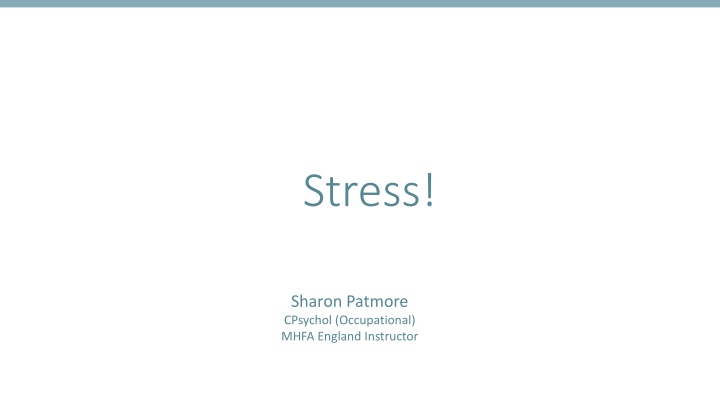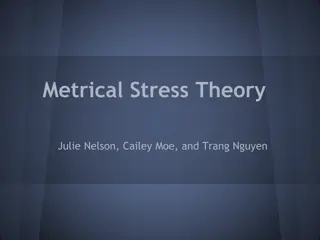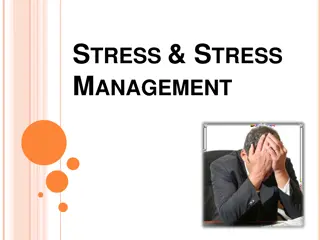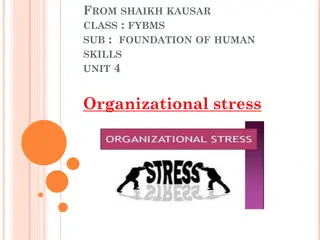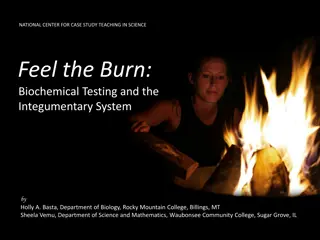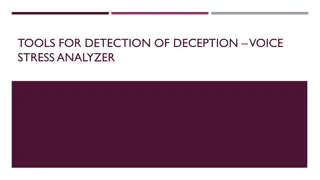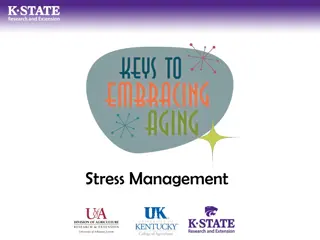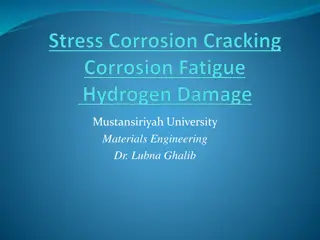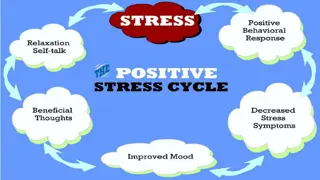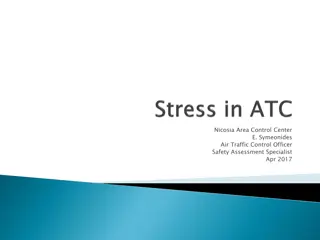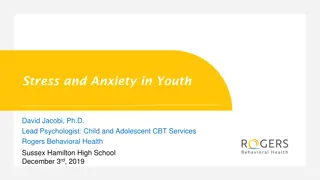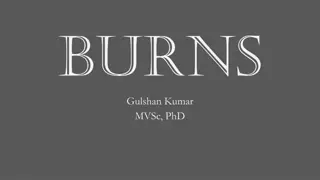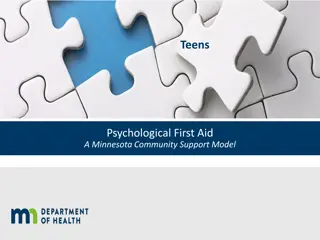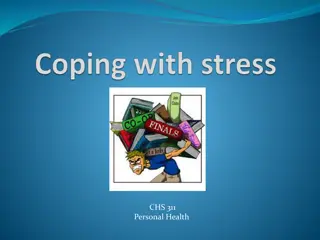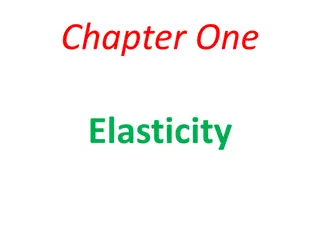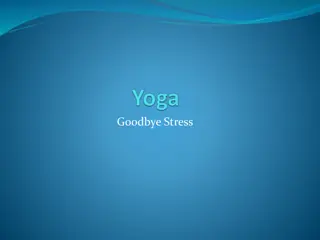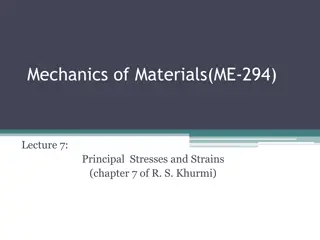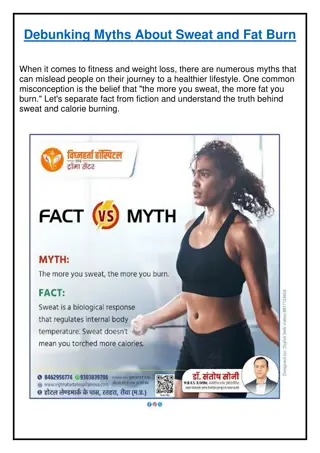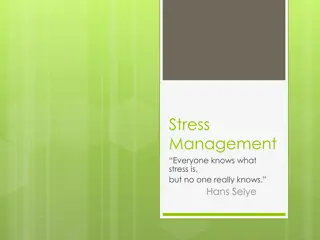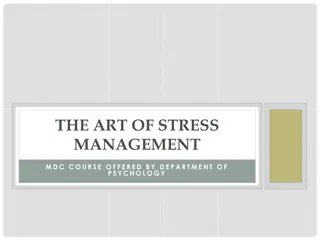Prevalence of Stress and Burn-out
Stress and burn-out are prevalent in various aspects of life, including the workplace. Learn about key drivers of work-related stress, additional pressures individuals face, and strategies to manage stress better. Explore statistics highlighting the impact of stress on mental health and the top causes of burn-out. Discover the relationship between pressure and performance, along with the mental health continuum indicating signs of stress. Understand common sources of stress across environmental, life changes, physical, emotional, and work-related factors.
Download Presentation

Please find below an Image/Link to download the presentation.
The content on the website is provided AS IS for your information and personal use only. It may not be sold, licensed, or shared on other websites without obtaining consent from the author.If you encounter any issues during the download, it is possible that the publisher has removed the file from their server.
You are allowed to download the files provided on this website for personal or commercial use, subject to the condition that they are used lawfully. All files are the property of their respective owners.
The content on the website is provided AS IS for your information and personal use only. It may not be sold, licensed, or shared on other websites without obtaining consent from the author.
E N D
Presentation Transcript
Stress! Sharon Patmore CPsychol (Occupational) MHFA England Instructor
Outline The prevalence of Stress Understanding the key drivers of Work-related Stress The additional pressures we put on ourselves What we can do to manage stress better Resources available.
Stress and Burn-out A little bit of stress is good for you? Burn-out is a syndrome conceptualized as resulting from chronic workplace stress that has not been successfully managed (WHO) The adverse reaction people have to excessive pressures or other types of demandplaced on them (HSE)
HSE Statistics Published Nov 24 Healthcare professions significantly higher rates of reported work-related stress, depression or anxiety. 34% of workers aged 18 to 24-years-old have taken time off due to poor mental health caused by stress, compared with 15% of those aged 55 or over. Workers aged 35 to 44-years-old were most likely to have experienced high or extreme levels of stress and pressure often or always in the past year (40%). 10m employees call in sick because of stress or burnout. Top causes for burnout are: High Workload, Poor work-life balance, Poor management.
Pressure Performance Curve Performance Pressure Ref: Yerkes & Dodson
Mental Health Continuum exhausted, physical health problems, excessive anxiety, short fuse/easily angered, unable to sleep/stay asleep, avoidance/isolation tired/low energy, nervousness, irritability, sad/low moods, procrastination, less socially active energised, physically well, normal moods, normal sleep, socially active fatigue/aches/pains, increased anxiety, disturbed sleep, socially withdrawn
Common Sources of Stress? Environmental Poor housing Social isolation Unemployment Moving home or travelling Financial problems Life Changes Leaving Home, getting married, new babies Relationships breakdowns Health problems or illness Bereavements or accidents Physical Lack of routine Poor diet Drugs/alcohol Emotional Peer pressure Conflicting values Uncertainty WORK
Drivers of work-related stress Degree of control over the way we do our work Level of demands placed on us, eg work patterns, workload, environment Low/ no supportor encouragement from colleagues or managers Ill-defined or unclear role free from conflicting activities Difficulties with relationshipsat work including promoting positive working that reduces conflict How we are consulted about changeat work
Do we lead by example? What do we advise our clients to do to manage stress more effectively? Do we do what we advise our clients to do?
Stress Container Stressors Size of the container varies Overflow - Stress Signature Helpful Unhelpful Coping Strategies Coping Strategies
Coping Strategies Exercising Eating healthily Sleeping well Being organised Asking for help Talking to others Breathing Exercises Disconnecting IT/Social Media Managing time Engage with Employee benefits Being kind to self
Focussed Breathing Make yourself as comfortable. Loosen any clothes that restrict your breathing. Sitting or standing, place both feet flat on the ground and place your feet roughly hip- width apart. Let your breath flow as deep down into your body as is comfortable, without forcing it. Breathing in through your nose and out through your mouth. Breathe in gently and regularly counting from 1 to 5. You may not be able to reach 5 at first. Then let it flow out gently, counting from 1 to 5 again. Keep doing this for at least 5 minutes.
Sleep Underrated in importance 7-9 hours of sleep for adults Length varies for each person Good sleep hygiene habits
New Years resolutions Are these helpful or do they add stress for us? What resolutions did you choose? Are you successful in implementing them? Link to existing routine(s)
HSE Statistics Published Nov 24 Alleviating stress and preventing burnout at work is helped by having: a healthy work-life balance (56%), a supportive line manager (43%) or supportive colleagues and peers (42%) reasonable adjustments at work (38%), professional support for mental health such as Employee Assistance Programmes or coaching (29%) and organisations offering staff training around mental health at work (24%)
What can you do? Recognise changes in yourself and others Understand the key drivers of your stress Remember to use your helpful coping strategies Know where you can go for help
Where can individuals go for help? Get help with stress - NHS (www.nhs.uk) Stress - Every Mind Matters - NHS (www.nhs.uk) Managing stress and building resilience - tips - Mind Use of Apps: Headspace mindfulness and meditation Calm relaxing the mind
Where can organisations go for help? HSE: https://www.hse.gov.uk/stress/ https://www.hse.gov.uk/stress/talking-toolkit.htm https://www.hse.gov.uk/stress/risk-assessment.htm Line Manager Competency Indicator Tool - https://www.hse.gov.uk/stress/mcit.htm
What will you now do differently? The prevalence of Stress Understanding the key drivers of Work-related Stress The additional pressures we put on ourselves What we can do to manage stress better Resources available.
Questions? Thank you for listening and participating Sharon Patmore CPsychol (Occupational)
